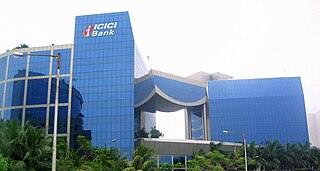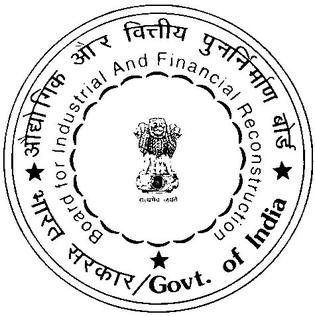Funding is the act of providing resources to finance a need, program, or project. While this is usually in the form of money, it can also take the form of effort or time from an organization or company. Generally, this word is used when a firm uses its internal reserves to satisfy its necessity for cash, while the term financing is used when the firm acquires capital from external sources.

ICICI Bank Limited is an Indian multinational bank and financial services company headquartered in Mumbai with a registered office in Vadodara. It offers a wide range of banking and financial services for corporate and retail customers through various delivery channels and specialized subsidiaries in the areas of investment banking, life, non-life insurance, venture capital and asset management.
Housing Development Finance Corporation was an Indian private-sector mortgage lender headquartered based in Mumbai. It was widely recognised as the largest housing finance company in India. In addition to its core mortgage lending operations, HDFC had diversified interests through its associate and subsidiary companies, including banking, life and general insurance, asset management, venture capital, and deposit services.

The National Bank for Agriculture and Rural Development (NABARD) is an All India Development Financial Institution (DFI) and an apex Supervisory Body for overall supervision of Regional Rural Banks, State Cooperative Banks and District Central Cooperative Banks in India. It was established under the NABARD Act 1981 passed by the Parliament of India. It is fully owned by Government of India and functions under the Department of Financial Services (DFS) under the Ministry of Finance.

Small Industries Development Bank of India (SIDBI) is the apex regulatory body for overall licensing and regulation of micro, small and medium enterprise finance companies in India. It is under the jurisdiction of Ministry of Finance, Government of India headquartered at Lucknow and having its offices all over the country.
The Sampoorna Grameen Rozgar Yojana was a scheme launched by the Government of India to gain the objective of providing gainful employment for the rural poor. From 21 February 2003, EAS became an allocation-based scheme. The programme was implemented through the Panchayati Raj institutions.

Shriram Group is an Indian conglomerate headquartered in Chennai. It was founded on 5 April 1974 by R. Thyagarajan, AVS Raja and T. Jayaraman. The group had its beginning in chit funds business and later on entered the lending and insurance businesses.

Infrastructure Leasing & Financial Services Limited (IL&FS) is an Indian state-funded infrastructure development and finance company. It was created by public sector banks and insurance companies.
All India Financial Institutions (AIFI) is a group composed of financial regulatory bodies that play a pivotal role in the financial markets. Also known as "financial instruments", the financial institutions assist in the proper allocation of resources, sourcing from businesses that have a surplus and distributing to others who have deficits - this also assists with ensuring the continued circulation of money in the economy. Possibly of greatest significance, the financial institutions act as an intermediary between borrowers and final lenders, providing safety and liquidity. This process subsequently ensures earnings on the investments and savings involved. In Post-Independence India, people were encouraged to increase savings, a tactic intended to provide funds for investment by the Indian government. However, there was a huge gap between the supply of savings and demand for the investment opportunities in the country.
Mahindra & Mahindra Financial Services Limited (MMFSL) is an Indian rural non-banking financial company headquartered in Mumbai. It is amongst the top tractor financers in India, with 1000+ offices across the country.

The Board for Industrial and Financial Reconstruction (BIFR) was a development finance institution under the ownership of Ministry of Finance, Government of India, part of the Department of Financial Services of the Ministry of Finance. Set up in January 1987 by the Rajiv Gandhi government, its objective was to determine sickness of industrial companies and to assist in reviving those that may be viable and shutting down the others. On 1 December 2016, the Narendra Modi government dissolved BIFR and referred all proceedings to the National Company Law Tribunal (NCLT) and National Company Law Appellate Tribunal (NCLAT) as per provisions of Insolvency and Bankruptcy Code.

The Piramal Group is an Indian multinational conglomerate that has presence across various sectors such as healthcare, life sciences, drug discovery, financial services, alternative investment and real estate.
The Dalit Indian Chamber of Commerce and Industry (DICCI) is an Indian association that promotes business enterprises for Dalits. It was founded in 2005 by Milind Kamble. Some of the key members of DICCI are Kalpana Saroj, Chandra Bhan Prasad and Rajesh Saraiya.
Bandhan Bank Ltd. is a banking and financial services company, headquartered in Kolkata.
Micro Units Development and Refinance Agency Bank ) is a public sector financial institution in India. It provides loans at low rates to micro-finance institutions and non-banking financial institutions which then provide credit to MSMEs. It was launched by Prime Minister Narendra Modi on 8 April 2015.
Dr. Sailendra Narain is a development finance specialist born in Nawadah, Bihar Province, India. For over 40 years, Narain has been a pioneer in developing the global SME sector. His specialities include: designing policy frameworks for SME Growth, establishing SME financing programs in banking and development financial institutions, and capacity building for SMEs with a focus on Entrepreneurship.

Stand-Up India was launched by the Government of India on 5 April 2016 to support entrepreneurship among women and SC & ST communities. Stand Up India Loan Scheme is a government initiative launched by the Government of India in 2016 to promote entrepreneurship and facilitate bank loans to Scheduled Caste (SC) / Scheduled Tribe (ST) and women entrepreneurs in the country. The scheme aims to provide loans between Rs.10 lakhs and Rs.1 crore for setting up a greenfield enterprise in manufacturing, trading or services sector.
Kerala State Development Corporation for Christian Converts from Scheduled Castes and the Recommended Communities is a Government of Kerala undertaking located at Kottayam which provides financial help to Christian converts.

AU Small Finance Bank Limited is an Indian scheduled commercial small finance bank and India’s largest tech-led small finance bank, based in Jaipur. It was founded as vehicle finance company and NBFC, AU Financiers (India) Ltd in 1996 and converted into a full-fledged small finance bank on 19 April 2017.

National Investment and Infrastructure Fund Limited (NIIFL) is an Indian public sector company which maintains infrastructure investments funds for international and Indian investors anchored by the Government of India. The objective behind creating this organisation was to catalyse capital into the country and support its growth needs across sectors of importance.









